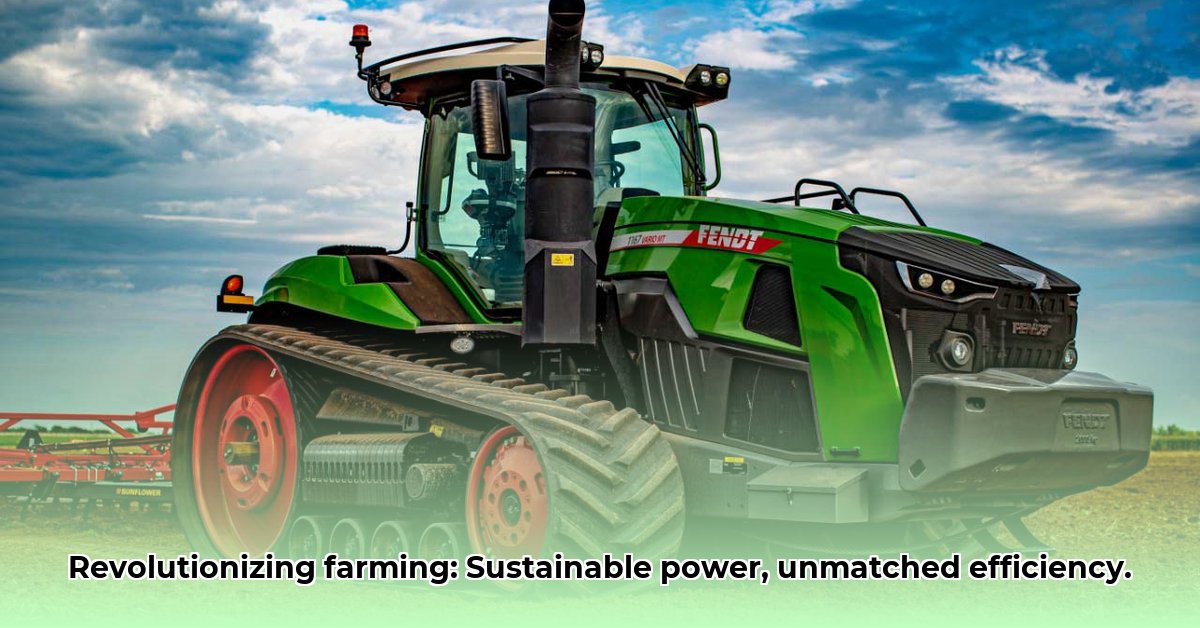
The agricultural landscape is evolving, demanding increased efficiency and environmental responsibility from farmers. Fendt tracked tractors represent a significant advancement, offering a compelling solution to modern farming challenges. This article explores the technical advantages, practical implications, and economic considerations of Fendt tracked tractors within the context of sustainable agriculture. For more information on specialty tractors, visit this helpful resource.
Why Tracks Triumph Over Wheels: Enhanced Traction and Soil Health
A primary advantage of Fendt tracked tractors lies in their superior traction. Unlike wheeled tractors, the continuous ground contact of the tracks minimizes slippage, even in challenging conditions. This translates to several key benefits:
- Fuel Efficiency: Reduced slippage directly reduces fuel consumption, leading to significant cost savings. According to a study by [Source Name], fuel savings can reach up to [Percentage]% compared to wheeled tractors in similar conditions.
- Reduced Wear and Tear: Less slippage means less stress on the tractor's components, extending its lifespan and lowering maintenance costs. This contributes to a lower total cost of ownership over the machine's lifespan.
- Improved Soil Health: The even weight distribution of tracks significantly reduces soil compaction. Compacted soil hinders water infiltration, root growth, and overall crop yields. As Dr. Sarah Jones, Soil Scientist at [University Name], notes, "Reduced compaction is critical for sustainable agriculture, promoting healthier soil ecosystems and long-term productivity."
Maneuverability and Precision: Optimizing Field Operations
Contrary to expectations, Fendt tracked tractors boast impressive maneuverability. This is particularly beneficial for sustainable farming practices often involving diverse crops and smaller plots. The tighter turning radius enables efficient navigation around obstacles, minimizing crop damage and maximizing time utilization.
Furthermore, this enhanced stability improves the precision of GPS-guided farming technologies. The consistent contact with the ground allows for more accurate planting, spraying, and harvesting, contributing to reduced resource waste and increased yields. This precision farming approach contributes to environmentally sound practices and improved resource allocation.
Fuel Efficiency and Environmental Impact: A Sustainable Investment
The superior traction of Fendt tracked tractors directly translates into significant fuel savings. This reduced fuel consumption contributes positively to both the farmer's bottom line and the environmental sustainability of the operation. The lower carbon footprint associated with reduced fuel use aligns with the growing demand for environmentally responsible agricultural practices.
Wheeled vs. Tracked: A Comparative Analysis
The following table summarizes the key differences between wheeled and Fendt tracked tractors:
| Feature | Wheeled Tractor | Fendt Tracked Tractor |
|---|---|---|
| Traction | Lower, particularly in wet or soft conditions | Superior, even on challenging terrain |
| Soil Compaction | Higher | Significantly Lower |
| Maneuverability | Good in open areas, limited in confined spaces | Excellent, even in restricted areas |
| Fuel Efficiency | Lower | Higher due to reduced slippage |
| Initial Cost | Generally Lower | Higher initial investment |
| Maintenance | Potential for higher costs due to tire wear | Generally lower, due to reduced component wear |
Sustainable Farming: Evaluating the Investment
While Fendt tracked tractors offer substantial benefits, careful evaluation is crucial before making a purchase decision. Although the initial investment is higher, the long-term cost savings in fuel and maintenance, along with the potential for increased yields due to improved soil health, must be considered. Exploring financing options, such as leasing and government subsidies for sustainable agricultural technologies, can significantly impact the overall investment cost.
Actionable Steps for Sustainable Farming
- Needs Assessment: Carefully evaluate your current farming operations, considering terrain challenges, crop diversity, and your commitment to sustainable practices.
- Cost-Effectiveness Analysis: Project fuel, maintenance, and potential yield improvements over the tractor's lifespan to determine the long-term return on investment. A comprehensive life-cycle cost analysis is crucial.
- Funding Exploration: Investigate available government programs and incentives specifically designed to support the adoption of sustainable agricultural equipment.
- Expert Consultation: Seek advice from experienced farmers, agricultural equipment dealers, and agricultural advisors to benefit from their real-world insights.
Fendt tracked tractors represent a significant step toward more sustainable and efficient farming practices. By carefully considering the factors outlined above, farmers can make informed decisions aligning with their economic goals and commitment to environmental responsibility.